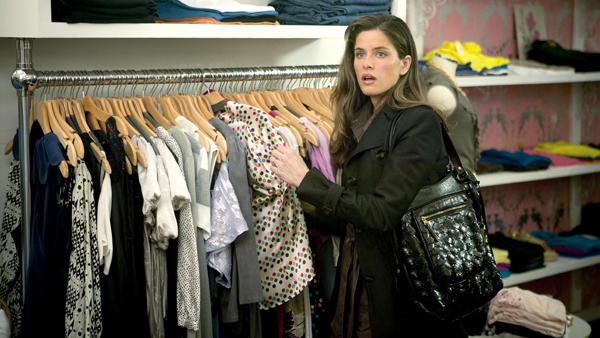|
Reviews of Recent Independent, Foreign, & Documentary Films in Theaters and DVD/Home Video

2010 Tribeca Film
Festival For a festival still forming an identity, 2010 is a year the Tribeca Film Festival moves towards a very specific direction. Perhaps due to the new management under former Sundance head Geoffrey Gilmore, the sea change features none of the blockbuster Hollywood showpieces of several years ago (Speed Racer, anyone?), apart from the Shrek Forever After opening-night premiere. Instead, the programming gives less established filmmakers a shot at an auspicious Manhattan debut. The following early selections give a taste of what’s to come, not only until May 2nd downtown, but as more and more of these young directors start to emerge. In Please Give, writer/director Nicole Holofcener gives her great cast equal attention in a smart story about the moral dilemmas of upper-middle-class Manhattanites. Oliver Platt and Catharine Keener are a married couple waiting (not impolitely) for their elderly neighbor to croak so they can knock down the wall and expand their apartment. They befriend the granddaughters (Amanda Peete and Rebecca Hall), whose contentious relationship further complicates matters, while their teenaged daughter (Sarah Steele) refuses to see past the zit at the end of her nose. Unique and committed performances all, how does one choose a favorite? Holofcener never stumbles throughout the complicated story, and manages to offer a few little lessons for today’s conscientious neighbor. How to externalize the angst of commitment? Director Dana Adam Shapiro (Murderball) chooses a unique way in Monogamy as we follow Theo (Chris Messina), a soon-to-be husband, on an obsessive voyeurism kick. He takes his photography business to a darker level by photographing the sexual exhibitionism of a mystery woman who contacts him only via email. His subsequent examinations of his photos recall the best moments of films like Antonioni’s Blow-Up (1966). Shapiro is fearless in his pursuit of the seedier side of pre-nuptial stress, and somehow pulls off scenes as outrageous as a bartender’s 10-year-old daughter serving drinks to patrons or the mystery woman pleasuring herself in the middle of a crowded New York City park. Francesca Woodman’s short life as a photographer and performance artist is examined in The Woodmans, a documentary by C. Scott Willis. Francesca was the daughter of two very intelligent, committed artists, who recount her young life, early suicide attempt, and describe with pain the final one that ended it. Their enlightened outlook keeps us far from any morbidity though, and the interviews become descriptions not only of a depressed young artist, but also of an American environment that is perhaps too slow to accept artists in general. Omar Rodriguez Lopez, front man for the band the Mars Volta, is something of a Fassbinder wannabe. In post-production on his third (!) feature already this year, his first is The Sentimental Engine Slayer, which he wrote, directed, and stars in. Those who are familiar with Lopez’s groundbreaking musical projects might suspect the film to be in a similar vein—short on message, big on imagery, like a Jodorowsky meets Cheech and Chong acid trip—but actually this is something a little more involved. However incomprehensible plotwise, there’s a distinct message here. As in much of Fassbinder’s work, the strong arm of society continually pushes Lopez’s character(s) around, and, like a bully, it comes down harder when he attempts to retaliate. Documentary filmmaker Chuck Workman (who boasts numerous docs on film, art, and media) turns his sights on the “(mostly) American Avant Garde” film world in Visionaries. Workman goes down the checklist of significant experimental films over the last century (Anger, Deren, Friedrich, Menken, Marker, and Snow barely scratch the surface), and offers fine commentary by such personalities as Peter Kubelka, Norman Mailer, and the grand, undisputed steward of underground cinema, Jonas Mekas. The clips are a well-researched survey of works familiar to anyone who’s ever had a taste of experimental cinema. The whole film eventually becomes an extended publicity piece for Manhattan’s Anthology Film Archives, Mekas’s independent art-house theater in the East Village. It’s among the last of its kind, and rightly deserves the love and recognition as Workman demonstrates when he interviews a ticket line full of young people, who admit to never having heard the names Brakhage, Mekas, and other such giants of art film. Neil Jordan’s latest, Ondine, is a pseudo-fairy tale about a water nymph who comes to land to marry a fisherman. At least, all those living in the poor Irish fishing village wish it were a fairy tale when a pretty blonde French woman is saved from drowning. Jordan’s working-class wisdom makes an otherwise confusing story a relevant parable, and Colin Farrell creates an interesting character in Circus, the recovering alcoholic fisherman who saves and falls in love with the siren. Stephen Rea puts in a great performance as Circus’s hardworking priest. Monica and David, a documentary directed by Alexandra Codina, takes us through the marriage of two lovers suffering from Down syndrome. Codina frequently allows the question to arise: what exactly makes this marriage any different? The two are in paradise during the time leading up to the union, there is a triumphant honeymoon, and then reality hits. Health problems are all-encompassing, and the easiest message to remember with this film is that love is all-encompassing as well.
Spork, dare I say it, bears consistent and uncanny resemblance to Napolean Dynamite (2004), and must have certainly been conceived with that film in mind. J. B. Ghuman Jr.’s first feature almost feels like a kind of remake, from its toon-like production design and proscenium staging, to its misfit public schoolers with their rural-minded families, and even a dance competition finale. Spork (Savannah Stehlin) is a hermaphrodite who, for the sake of keeping the laughs coming, has quirky friends. Most significant among them is Sydney Park’s Tootsie Roll, a fast talking B-girl who encourages Spork to learn breakdancing. The film features a hot soundtrack and often digresses into extended, though not unwatchable, music video segments. French director Kim Chapiron, known mostly for a prolific short film repertoire, arrives from Anyprison, USA, with Dog Pound, his second feature. He follows the trials and exploits of three teens sentenced to a strict juvenile detention center, focusing on the top-down brutality of the system—an uncaring warden allows an excitable corrections officer to enact his own form of discipline through intimidation and violence. Chapiron’s stance is clear: f#*k the police, so to speak. He makes a good point about the cyclical violence of a unilateral disciplinary system, something akin to Alan Clarke’s work (Scum, Made in Britain), but he misses the mark by starting his hero off as a bloodthirsty thug and ironically relying too much on violence to keep the film moving. This is really an action flick in disguise as a social cause.
Lee Isaac Chung, in perhaps
his requisite sophomore slump,
falters slightly in his unique stylistic exploration. Where his debut, Munyurangabo (2007), succeeded in
its deliberate snail’s pace and passive camera placement, Lucky
Life seems to just miss the point. A story about the cancer
death of a close friend is edited out of chronological sequence,
confusing the plot and catching us off guard while we’re still trying to
decode Chung’s weird framings and experiments with time. It’s
unclear why some shots begin before the action, or why so much space is
often left in the frame. Apparently, he’s even boggled the boom operator
with his camera tilts as the microphone appears above the characters’
heads more than a couple times. I’d call it a tone poem, but that would
just be too easy. Michael Lee
|


